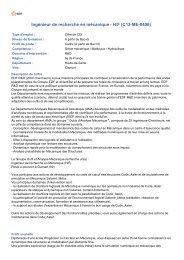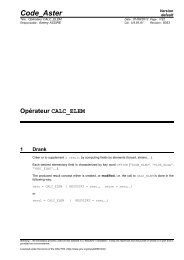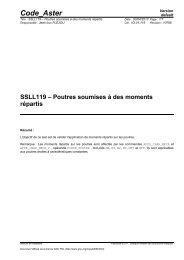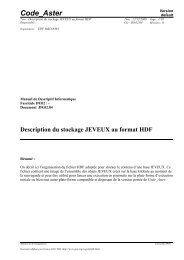U1.03.01 - Code_Aster
U1.03.01 - Code_Aster
U1.03.01 - Code_Aster
Create successful ePaper yourself
Turn your PDF publications into a flip-book with our unique Google optimized e-Paper software.
<strong>Code</strong>_<strong>Aster</strong><br />
Titre : Superviseur et langage de commande<br />
Version<br />
default<br />
Date : 08/05/2012 Page : 4/16<br />
Responsable : Christophe DURAND Clé : <strong>U1.03.01</strong> Révision : 8998<br />
2.2 The total execution or step by step<br />
a command set can be built and executed according to two modes:<br />
the total mode for which all the stages of the command set are initially built then executed in<br />
their order of appearance. This mode is chosen by key word PAR_LOT='OUI' in the ordering<br />
of starting DEBUT,<br />
the mode step by step for which each stage is immediately carried out after its construction.<br />
This mode is chosen by key word PAR_LOT='NON' in command DEBUT.<br />
If the user does not specify anything in the command boot, total mode (PAR_LOT='OUI') is retained.<br />
These two modes present each one their advantages and disadvantages.<br />
The total procedure guarantees to the user that all its file is semantically correct before starting<br />
computations which could fail or not converging. It would be indeed a shame to stop in fatal error after<br />
a long resolution because of a key word forgotten in a command of postprocessing.<br />
That also means that all the stages of the command set are built and stored. If several thousands of<br />
stages are reached, that can become very consuming memory and this mode is not then advised any<br />
more.<br />
The mode step by step builds a stage only after having executed the preceding one. It thus detects<br />
only the semantic errors of the pending order and presents the disadvantage described above. It<br />
however makes it possible to exploit a result computed (in a concept) in the command file for, for<br />
example, to place conditional instructions there.<br />
In this mode, the executed stage is released at once from the memory. The memory used is then<br />
independent amongst stage to execute.<br />
Here an example of loop with stopping criteria on the value of a computed quantity, stored in the<br />
concept of the type counts : RELV [K]. If for example a compulsory key word misses in the call to<br />
POST_RELEVE_T, that will be detected only after the complete execution of the first MECA_STATIQUE.<br />
On the other hand, the mode step by step makes here possible the assignment of variable SYY since<br />
concept RELV [K] was completely computed at the time when the supervisor executes this line.<br />
DEBUT (PAR_LOT='NON')<br />
RESU= [None] *10<br />
RELV= [None] *10<br />
for K in arranges (1.10):<br />
RESU [K] =MECA_STATIQUE (…)<br />
RELV [K] =POST_RELEVE_T (…)<br />
SYY=RELV [K] [“VMIS”, 4]<br />
yew SYY < criterion:<br />
station-wagon<br />
FIN ()<br />
Il faut noter que the choice of a procedure conditions the order in which will proceed the semantic<br />
analysis (ETAPE by ETAPE or overall for all the JDC). But, in both cases, the parsing python is<br />
always made as a preliminary for all the command file.<br />
Note:<br />
EFICAS can exclusively generate and read again only command sets containing commands<br />
ASTER, without other instructions python; this independently of selected mode PAR_LOT.<br />
2.3 The construction of the Lors<br />
Warning : The translation process used on this website is a "Machine Translation". It may be imprecise and inaccurate in whole or in part and is<br />
provided as a convenience.<br />
Licensed under the terms of the GNU FDL (http://www.gnu.org/copyleft/fdl.html)




![[V5.02.132] SDNL132 - Pendule rigide avec contacts ... - Code_Aster](https://img.yumpu.com/22011747/1/184x260/v502132-sdnl132-pendule-rigide-avec-contacts-code-aster.jpg?quality=85)
![[R5.03.22] Constitutive law in large rotations and small ... - Code_Aster](https://img.yumpu.com/22011735/1/184x260/r50322-constitutive-law-in-large-rotations-and-small-code-aster.jpg?quality=85)
![SSLV135 – Critères d'amorçage en fatigue sous char[...] - Code_Aster](https://img.yumpu.com/22011730/1/184x260/sslv135-criteres-damorcage-en-fatigue-sous-char-code-aster.jpg?quality=85)
![[U2.08.03] Operating instructions for linear solvers - Code_Aster](https://img.yumpu.com/19451713/1/184x260/u20803-operating-instructions-for-linear-solvers-code-aster.jpg?quality=85)
![SSLS130 - Zoom structural : plaque trouée soumise [...] - Code_Aster](https://img.yumpu.com/19451712/1/184x260/ssls130-zoom-structural-plaque-trouee-soumise-code-aster.jpg?quality=85)
![[U4.90.03] Macro-commande OBSERVATION - Code_Aster](https://img.yumpu.com/18316250/1/184x260/u49003-macro-commande-observation-code-aster.jpg?quality=85)
![[R7.20.01] Projection of a field on a mesh - Code_Aster](https://img.yumpu.com/17613309/1/184x260/r72001-projection-of-a-field-on-a-mesh-code-aster.jpg?quality=85)
![MTLP103 - Trempe d'un barreau cylindrique en acier[...] - Code_Aster](https://img.yumpu.com/17583463/1/184x260/mtlp103-trempe-dun-barreau-cylindrique-en-acier-code-aster.jpg?quality=85)

![SSNS111 - Flexion d'une dalle en béton armé sous c[...] - Code_Aster](https://img.yumpu.com/17299553/1/184x260/ssns111-flexion-dune-dalle-en-beton-arme-sous-c-code-aster.jpg?quality=85)


![[U1.03.02] Méthodes Python d'accès aux objets Aster - Code_Aster](https://img.yumpu.com/17211538/1/184x260/u10302-methodes-python-dacces-aux-objets-aster-code-aster.jpg?quality=85)
![[U7.05.21] Procedure IMPR_RESU - Code_Aster](https://img.yumpu.com/17208904/1/184x260/u70521-procedure-impr-resu-code-aster.jpg?quality=85)